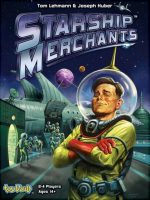
Starship Merchants
2-4
14+
90
Toy Vault presents STARSHIP MERCHANTS, a game by Tom Lehmann and Joseph Huber.
Two millennia after the dawn of space travel, the galaxy hums with prosperity and peace. But as mankind and its neighbors colonized the stars, the burgeoning need for resources was apparent.
As a plucky entrepreneur you must explore the edges of space searching for precious minerals.
Will you buy the fastest ship in the sector? Can you afford to hire the best pilot in the galaxy?
Shall you choose to purchase the latest state-of-the-art gadgets, invest in planetary refineries or pay off your rising debt?
The cargo you haul could be worth fortune, so grab your helmet and suit up! The cosmos and mountains of wealth call in Toy Vault's STARSHIP MERCHANTS!
User Reviews (1)
Add a Review for "Starship Merchants"
You must be logged in to add a review.

Y’know the classic description of a chaotic system: the butterfly flaps its wings in Southeast Asia and some event happens in New York as a result?
This game, at least at first blush, is more than a little like that. There’s a fair bit of randomness (two shuffled decks of cards appear in some order, and one pulls Ore tokens from a bag when prospecting) but (after seventeen plays!) it seems to me that the primary driver of the game outcome are the downstream ripples from the decisions the players make.
That means that the game can easily seem capricious in a first play: the players haven’t yet been trained to see the tie between decision and outcome; and so one might (as we did!) complain that “the best player didn’t win.”
With practice, though, the best players absolutely do win. And the motivations for making one plausible decision over another start also to become clear. I’ve really enjoyed this for the last dozen plays, and would absolutely recommend it for folk willing to give it repeated and regular attempts. (Or, I guess, for folk that find the references to 2038 charming.)
Equally, I’d not recommend it to folk that won’t play often: a novice in a table of experienced players will lose (and not know why); and a table of novices will see a (superficially) random result. And neither of those are particularly compelling.